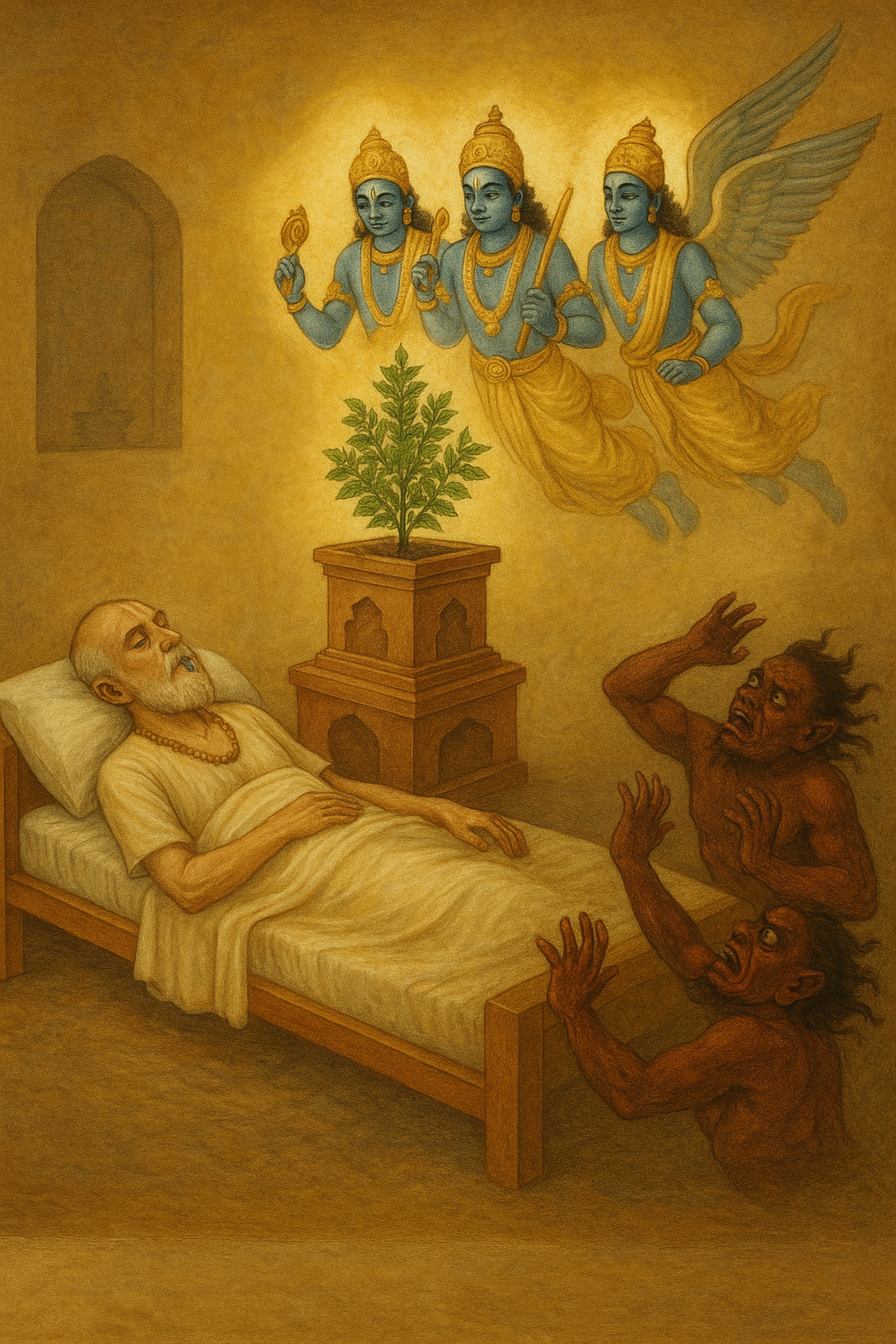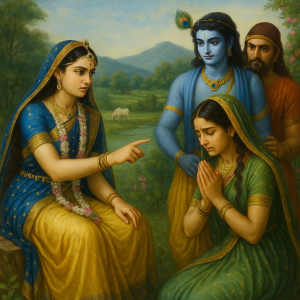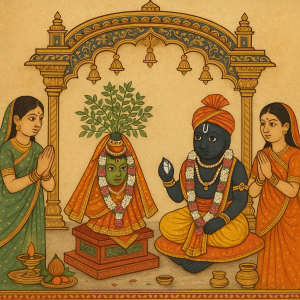The Queen of Devotion in Every Vaiṣṇava Home
After her divine transformation, Tulasī Devī became eternally worshiped by devotees across the world. In every Vaiṣṇava temple and home, she stands at the center of devotion—her leaves resting on the Lord’s food offerings, her plant encircled by circumambulations and songs of praise.
Tulasī is not merely a plant. She is a personal associate of the Lord, present in a visible form to accept the loving service of bhaktas. Her presence purifies the surroundings, sanctifies offerings, and bestows the fragrance of bhakti on all who bow before her.
Scriptural Foundations of Tulasī Worship
The Padma Purāṇa declares that even a single leaf of Tulasī offered to Lord Viṣṇu destroys the sins of millions of births. The Skanda Purāṇa proclaims that Tulasī is more powerful than thousands of sacrifices and purifications. Even the Garuḍa Purāṇa exalts her as the destroyer of all inauspiciousness.
Scriptures reveal that the Lord accepts offerings only when they include Tulasī leaves. Her touch purifies the food, the hands that pick her, and the mouth that chants before her. She is the personification of pure devotion (śuddha-bhakti).
Daily Rituals and Worship
Devotees rise early in the morning and offer obeisances to Tulasī Devī. After bathing and performing ācamana, they offer ghee lamp, water, flowers, incense, and kīrtana. The Tulasī-ārati song, composed by Vaiṣṇava ācāryas, glorifies her as the beloved of Kṛṣṇa, who bestows devotion at His lotus feet.
Devotees circumambulate her four times, chanting her prayers. No one is allowed to pluck Tulasī leaves without proper mantras and devotion, and leaves are never taken at night or during improper times.
It is also instructed not to chew or bite Tulasī leaves, as she is a divine personality, not ordinary foliage.
During Kārttika month, her worship is multiplied a thousandfold. Devotees light lamps around her, offer special garlands, and celebrate her divine marriage to the Śālagrāma-śilā on Tulasī Vivāha day.
The Glorious Rewards of Her Worship
The Padma Purāṇa explains that one who waters and worships Tulasī daily receives the result of all pilgrimage and sacrifices. She is so dear to Lord Viṣṇu that even Yamarāja cannot touch one who has worshiped her sincerely.
A person who plants, waters, or protects Tulasī will be granted residence in Vaikuṇṭha. Her leaves placed on the tongue of the dying person guarantee liberation, and her wood is used to make the japa mālā of devotees.
She grants health, peace, spiritual strength, and liberation, but more importantly, she gives love of God, the highest goal of life.
Lessons to Be Learned
1. Daily Worship Nourishes Devotion
Just as food nourishes the body, daily worship of Tulasī nourishes the soul. Śrīla Prabhupāda emphasized that serving Tulasī every day deepens one’s relationship with Kṛṣṇa and establishes sacred habits of humility and love.
2. Bhakti Is Greater Than Rituals Alone
Scripture states that thousands of rituals and yajñas are not equal to even one offering of Tulasī leaf with love. True devotion doesn’t depend on wealth or complexity—a single leaf, a drop of water, and a sincere heart are enough to please the Lord.
“If one offers Me with love a leaf, a flower, a fruit, or water, I accept it.” – Bhagavad-gītā 9.26
3. Tulasī is a Living Person, Not Just a Sacred Object
Vaiṣṇavas do not treat Tulasī as a mere plant. She is devī, consort of the Lord, and thus is worshiped, not exploited. Her leaves are plucked only after offering prayers. Her care is an act of seva, not gardening.
4. Association with Tulasī Destroys All Sin
Tulasī’s presence in the home purifies the atmosphere, chases away negative influences, and invites divine grace. Śrīla Prabhupāda instructed his followers to always keep Tulasī in the temple or home to benefit spiritually and materially.
5. Tulasī’s Leaves Sanctify Every Offering
The Lord accepts food only when it includes Tulasī leaves. This teaches that devotional consciousness must accompany every offering—just as the food must be touched by her, the heart must be filled with love and reverence.
6. Tulasī Grants Bhakti—The Supreme Goal
Above all, Tulasī is the personified gateway to Kṛṣṇa’s mercy. She does not give material benedictions, but rather bestows love of God—the rarest jewel in the universe. Worshiping her leads not to heaven but to the lotus feet of Śrī Kṛṣṇa.
Shall I proceed with the next story or section?



